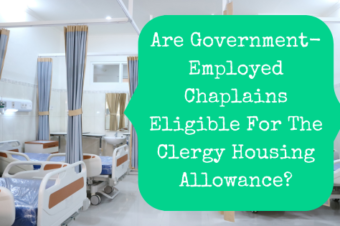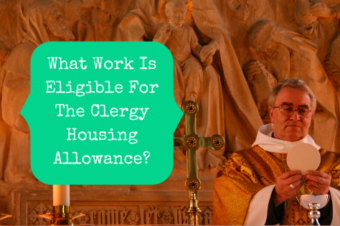
Keep your mortgage so you don’t lose your housing allowance and mortgage interest deduction!
How many times have you heard that advice? A reader recently asked me about it. Is that really good advice?
I know for most people, keeping a mortgage just for the mortgage interest deduction doesn’t make financial sense (though a lot of people do it). But you pastors have an amazing benefit in the ministerial housing allowance. It made me wonder, could the housing allowance be enough to turn the tables and make a mortgage worthwhile?
Example Mortgage
I decided to calculate it out to see for myself and to share with you. Here are my assumptions for this exercise:
Home Price: $200,000
Loan Amount: $160,000 (20% down payment avoids private mortgage insurance)
Mortgage Type: 30-year fixed rate
Mortgage Interest Rate: 5%
Income Tax Rate: 12%
Based on those assumptions, I calculated out the amount you would save in taxes with the housing allowance and mortgage interest deduction as well as the total amount of interest you would pay over the life of the loan.
I also looked at the opposite extreme, paying cash for the house, but that’s not a very realistic alternative for most people. Because of this, I figured out what the numbers would be if you made bi-weekly payments. The idea behind biweekly payments is that you make a mortgage payment every other week instead of monthly so by the end of the year you’ve made an extra payment, 13 instead of 12. Here are the numbers:
Calculations
Minimum Payments
Annual Principal & Interest Payments: $10,306.98
Total Interest Paid Over Life Of Loan: $149,209.25
Loan Paid Off In: 30 Years
Bi-Weekly Payments
Annual Principal & Interest Payments: $11,165.96
Total Interest Paid Over Life Of Loan: $121,723.99
Loan Paid Off In: 25.25 Years (I rounded it to 25 for my calculations)
No Mortgage
Annual Principal & Interest Payments: $0
Total Interest Paid Over Life Of Loan: $0
Loan Paid Off In: 0 Years
Now, there are a lot of other things that count towards the housing allowance besides just principal and interest payments. You have property taxes, homeowners insurance, utilities, furnishings, etc. However, those are all the same regardless of whether or not you have a mortgage. Here we are only looking at the effects of a mortgage, so those are the only numbers I included.
Here is how total loan costs compare between the three situations:
| 30-Year Fixed Rate | Biweekly Payments | Pay Cash | |
| Total Interest Paid | $149,209.25 | $121,723.99 | $0 |
| Tax Benefit Of Housing Allowance* | $37,105.13 | $33,497.88 | $0 |
| Mortgage Interest Deduction** | $17,905.11 | $14,606.88 | $0 |
| Cost of Loan*** | $94,199.01 | $73,619.23 | $0 |
*Tax Benefit Of HA calculated as 12% of annual principal and interest payment multiplied by the duration of the loan.
**Interest Deduction calculated as 12% of the total interest paid.
***Cost Of Loan is calculated as the total interest paid less the tax benefit of the housing allowance less the mortgage interest deduction.
Other Factors To Note
There are other factors that will affect how this would apply to you personally:
- You have to itemize your deduction to receive a benefit for paying mortgage interest. With the new higher standard deduction, it is possible that you will not itemize and receive this benefit.
- Being in a lower tax bracket will decrease your tax savings and a higher tax bracket will increase them. For 2019, the 12% rate applies to singles with a taxable income of $9,701 – $39,475 and married couples with a taxable income of $19,401 – $78,950.
- Having a lower interest rate will decrease the overall cost of the loan and a higher one will increase the cost.
- Your housing allowance is limited by the fair market rental value of the house. If it is less than your biweekly payments then you will not save as much in taxes as in my calculations above.
What About Opportunity Costs?
So, if you took out this mortgage you would save $55,010.24 in taxes over the next 30 years. That’s great! Except that it will cost you $149,209.25 in interest. That’s essentially giving the bank $3 in order to avoid giving the government $1. Without a mortgage, you may pay more in taxes but you pay less overall.
Those calculations make paying off the mortgage as fast as possible the clear winner. But, as with most things financial, it’s not quite as simple as that. There are opportunity costs involved. An opportunity cost is basically what you miss out on by not making another choice.
You see, ditching your mortgage is obviously best if you’re just going to be spending or sitting on your money. But, what if you invest it? What if you put $160,000 into the stock market when you got your mortgage? Would you still end up worse off financially 30 years later?
Not necessarily. If you invest your money rather than pay off your mortgage you may end out ahead. It’s a possibility, though, not a guarantee. The end results will depend upon your discipline, the investment decisions you make, and the way the market behaves.
What Should You Do, Then?
Wouldn’t life be easy if the internet could just tell you the best decisions to make about everything?
I’m sorry, but I’m not God, so I can’t tell you what’s best in your situation. I can only suggest things to think through as you make your decision:
- Consider your priorities; how does your desire to be debt free compare with your desire to maximize your finances?
- Consider your habits; would you have the discipline to invest your extra money instead of spending it?
- Consider your risk tolerance; do you have the guts to keep your money invested even if the market tanked?
- Consider various scenarios; what rate of return do you need in order to make investing instead of paying down the mortgage worthwhile for you? 5%? 8%? 12%? Is your required rate of return realistic?
Remember, the math clearly shows that giving $3 to the bank to keep $1 from the government is unwise. However, you may have other opportunities that make giving $3 to the bank worthwhile. Talk to your spouse, pray through it, do the math, and I wish you the best of luck!




4 Responses
Tom Hansen
March 5, 2021This is great input on this mostly-misunderstood topic. Thanks.
One thing of note I am running into: both of the organizations I’ve worked for, Young Life and InterVarsity (not churches, obviously, but still eligible to grant housing allowances to certain kinds of employees), don’t allow disbursements from the ’employer sponsored retirement fund accounts”. To start taking disbursements the accounts have to be rolled over to an IRA not managed by the organization (mine are with Fidelity and Vangaurd). That seems to make it impossible to get the housing allowance at some point in the future when I retire. I’m still investigating that and plan to talk with InterVarsity’s decision-makers since a full adoption of the housing allowance option as an organization is not even a year old now; lots to learn yet as an organization, and as those who receive it. If you have any wisdom on this issue, please pass it along!
Amy
March 8, 2021Tom, in order to keep their tax-advantaged status, employer-sponsored retirement plans have to follow certain rules. Because of this, usually you can’t take money from your account until you reach age 59 1/2 and leave the organization. There are other rules depending on the type of plan you have, but that is pretty standard. The best way to learn the exact rules for your plan is to look in the plan documents, which your plan administrator can provide to you. As this is new for your organization, they are perhaps being extra careful as they learn the ropes so as not to do anything wrong and jeopardize the tax-advantaged status of their retirement plan.
Andrew
June 26, 2021What do the numbers look like for a 15 year mortgage? That would probably close the gap a bit more.
Amy
July 1, 2021Andrew,
Yes, a 15-year mortgage would close the gap more and also our current low interest rates would close the gap even more now.